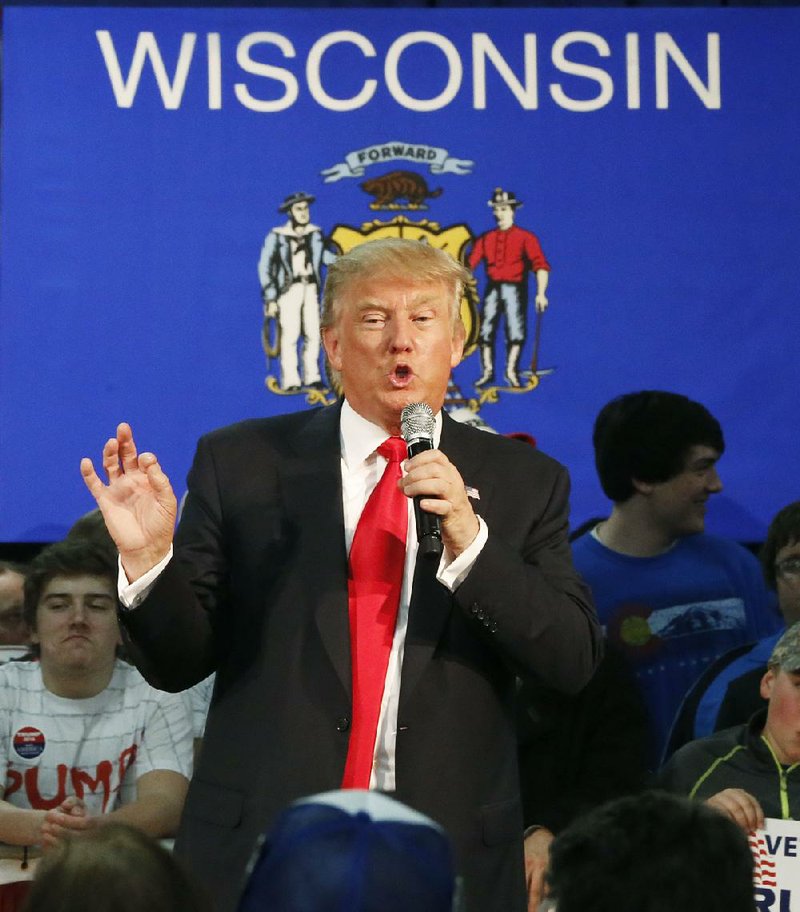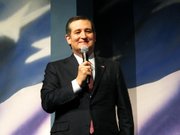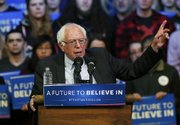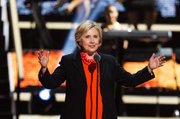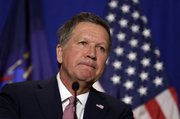RACINE, Wis. -- Donald Trump said Saturday that he wants voters to know that his message to the disaffected isn't meant for Republicans alone.
RELATED ARTICLES
http://www.arkansas…">Anti-Trump wave pressures brand names http://www.arkansas…">News networks push town-hall format
FULL ELECTION COVERAGE
The party's presidential front-runner told supporters that he's out to get independents and Democrats behind his cause even though "right now I'm catering to the Republicans."
Contenders in both parties bid for an edge ahead of Wisconsin's primaries Tuesday, none more actively than Trump, who's had a rough week -- largely because of his town-hall response to a question on abortion -- and faces a likely struggle against Sen. Ted Cruz of Texas in the state.
The Republican race is overshadowed by a persistent effort by Trump's rivals in the campaign and the party to force the nomination fight into the July convention -- and by his equivocations on whether he will be loyal to the GOP or bolt for an independent candidacy if he feels mistreated.
In Racine, in the first of his three rallies Saturday, Trump said little to suggest his allegiance with the GOP is cast in stone. He offered the critique that the Republican Party had a "falling-asleep reputation" until his campaign caught fire and lured millions of new voters out to primaries and caucuses.
Trump also defended himself after a series of statements on foreign policy and convoluted remarks on abortion rights in past days.
He asserted that his comments questioning the value of the North Atlantic Treaty Organization reflect widely held views, that it is conceivable to think that Japan and South Korea might someday gain nuclear arms and that he was dealing with hypotheticals when he said in the same week that women who have abortions should be punished if the procedure is banned, yet abortion laws should not be changed.
Off the stage, Trump expressed regret that he had retweeted an unflattering photo of Cruz's wife, Heidi, paired with a glamorous photo of his own wife, Melania, as part of a feud between the two men.
"Yeah, it was a mistake," he told New York Times columnist Maureen Dowd. "If I had to do it again, I wouldn't have sent it."
Meanwhile, Cruz sought favor in North Dakota, which is not holding a primary or caucuses in the 2016 Republican race. He addressed Republicans at a state convention that is selecting delegates who will go to the national convention unbound to any of the presidential candidates.
Trump and Ohio Gov. John Kasich sent supporters on their behalf to make the case that they should be backed by North Dakota's delegates at the Cleveland convention in July.
The outcome in Wisconsin will help determine whether Trump can seize the Republican nomination without a fight at the convention.
The Democratic race has grown increasingly bitter, too. Hillary Clinton and Bernie Sanders were set to attend a Wisconsin Democratic Party dinner. Their attention will quickly turn to an even more consequential contest, in New York on April 19, where Democratic front-runner Clinton hopes to avoid an upset in the state where she served as a U.S. senator.
Sanders, an independent senator from Vermont, urged rally-goers to turn out in droves Tuesday.
"Here is the political reality," he told a crowd on the University of Wisconsin's Eau Claire campus. "If there is a large voter turnout, if working people, many of whom have given up on the political process, if young people come, perhaps for the first time ... we will win on Tuesday.
"But, if there is a low voter turnout, we will probably lose. So, I am here to ask you all, not just to come out to vote, but to bring your friends, your aunts and your uncles -- let us have the largest voter turnout in Wisconsin primary history."
Bundled up in winter jackets and gloves, Sanders supporters waited for hours to hear him.
Sophomore Joseph Lehto said he probably will vote for an independent if Sanders doesn't get the nomination.
"Hillary Clinton is a conservative disguised by mildly social policies," he said. "She is a more of warmonger than just about anyone."
In a string of messages on Twitter and in a more formal statement, Clinton national press secretary Brian Fallon accused the Sanders campaign of playing "political games" and seeking to avoid agreement on a debate to have "fake excuses to attack Hillary Clinton."
Sanders' communications director, Michael Briggs, said it was his campaign that has been pushing for a New York debate and that the dates and venues suggested by Clinton "don't make a whole lot of sense."
Briggs took aim at one Clinton proposal in particular: an encounter on Monday night, which would coincide with the national championship game in men's college basketball.
Competing for attention with the game is "ludicrous," Briggs said in a statement.
The back-and-forth comes during a primary fight in which Clinton, a former secretary of state, has a lead in delegates but has yet to put away Sanders.
Sanders has won five of the past six states with primaries and caucuses, and polls have showed him with a narrow edge over Clinton in a primary coming up Tuesday in Wisconsin.
At Trump's second rally, in Wausau, five young men wearing T-shirts emblazoned with "Trump's wall" positioned themselves behind the candidate and drew cheers from the crowd. Some had walked in after visiting the adjacent bar hosting a meeting of the Wisconsin Bear Hunters Association.
Many in the crowd seemed unfazed by Trump's recent troubles, even after his shifting stance on abortion last week.
Trump supporter Brian Reif, 43, said "Reagan changed his mind on the issue, too" and that he wasn't bothered by Trump's occasional harsh statements about women.
Wisconsin has emerged as a proving ground for anti-Trump forces as his campaign hit a rough patch. Trump defended his campaign manager after he was charged with battery against a reporter, backtracked from comments regarding women and abortion, encountered a buzz saw of hostile interviews by conservative Wisconsin talk radio hosts and watched Cruz rise in some preference polls in the state.
In a 96-minute interview Thursday with The Washington Post, Trump made clear that he would govern in the same nontraditional way that he has campaigned, tossing aside decades of U.S. policy and custom in favor of a new approach to the world.
Over the course of the conversation, reported the Post on Saturday, Trump said that economic conditions are so perilous that the country is headed for a "very massive recession" and that "it's a terrible time right now" to invest in the stock market, embracing a distinctly gloomy view of the economy that counters mainstream economic forecasts.
Among other goals, Trump insisted that he would be able to get rid of the nation's more than $19 trillion national debt "over a period of eight years."
Information for this article was contributed by Jill Colvin, Calvin Woodward, James MacPherson, Kevin Burbach, Greg Moore and Jonathan Lemire of The Associated Press and by John Wagner, Anne Gearan, Bob Woodward and Robert Costa of The Washington Post.
A Section on 04/03/2016

